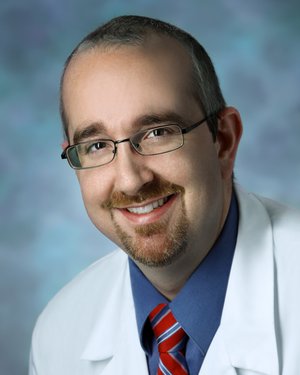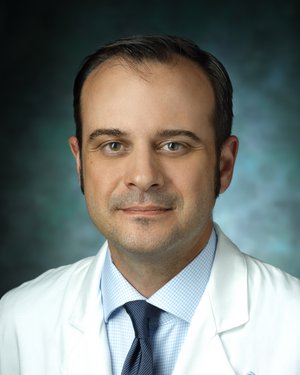The Johns Hopkins Stiff Person Syndrome (SPS) Center, led by Dr. Scott Newsome, offers patient education, symptom management and hope for the future for people with this rare disorder. Our multi-specialty team includes experts in neurology, immunology, ophthalmology, neuromuscular disease and related fields. With access to one of the largest databases of SPS biomarkers, our team works to advance our understanding of this disease and leads the way toward more effective treatments.
On this page:
Team | Approach | Research | Videos | Patient Info | Patient Resources | Donate
About Stiff Person Syndrome
Stiff person syndrome is a rare disease affecting only one or two people per million. It commonly causes muscle stiffness and painful spasms that worsen over time. They can be triggered by a variety of things including sudden movement, cold temperature or unexpected loud noises.
Learn more about stiff person syndromeWhy Choose Johns Hopkins SPS Center
Research-Based Approach
Tailored Treatments
Multi-Specialty Care
Patient Stories
Gay's Story

Ruth's Story

Our Team
Physicians
Staff
Lisa Fox, PA-C

Sarah Snoops, R.N.

SPS Educational Videos
Stiff Person Syndrome - Differential Diagnosis
Management of Stiff Person Syndrome
Stiff Person Syndrome, Stress, and Cancer
For Physicians: Stiff Person Syndrome Spectrum Disorders
Dr. Newsome discusses the prevalence and presentation of stiff person syndrome and the expanding clinical spectrum. He also shares an overview of diagnostic assessment and treatment options for these conditions.
SPS Research
An Extensive Stiff Person Syndrome Database
The center’s repository of SPS biomarkers and other patient data is among the world’s largest, providing rare insight into mechanisms of disease, criteria for accurate diagnosis and promising therapies.
Through long-term tracking of people with SPS, our team is gaining a better understanding of how SPS impacts people, and how to treat each person with the best possible outcomes in mind.
- Some of our main research goals include:
- Defining the full clinical spectrum of SPS (helps promote awareness)
- Identifying biomarkers of disease burden and pathogenesis (potential cause of SPS and response to treatment)
- Developing/finding better ways to treat SPS.
Patients of our center can be part of this research. There is little to no time commitment outside of your regularly scheduled visits.
SPS Research Papers
Our team has written numerous research papers on a variety of topics related to stiff person syndrome.
Patient Information
This is information is also available in the PDF form:
-
During your first appointment, you will meet with Dr. Newsome and his team. This visit might be long. While we strive to remain on schedule, Dr. Newsome also strives to be as thorough as possible. We are committed to training the next generation of experts in SPS, so you will likely meet our fellowship trainees as well.
If you are experiencing symptoms that could indicate SPS, our team may need to order or conduct certain tests to confirm the diagnosis. These tests may include:
- Blood work (usually done during your first visit and on many follow up visits)
- An electromyography (EMG) test to evaluate nerve and muscle function. It is often done during your first visit, even if you had it recently.
- If a lumbar puncture is recommended, it is usually done before your first visit, not on the same day.
-
To prepare for EMG, we ask that you stop taking all muscle spasm/relaxer medications for at least 24 hours before the test. Common examples of these medications include baclofen, clonazepam, diazepam, alprazolam, lorazepam, and tizanadine. You may feel poorly the day of your EMG, but you can take your medication(s) right after you finish the EMG study.
Make sure that your rheumatology, neurology and other doctors you saw for SPS symptoms send all relevant clinical notes to our access services team. These notes may include:
- Blood test results including anti-GAD (glutamic acid decarboxylase) 65 antibody level, amphiphysin antibody, and/or anti-glycine receptor antibody; as well as, several other serum autoantibodies, hemoglobin A1c and vitamin levels.
- Lumbar puncture results, specifically the anti-GAD65 antibody result (if previously done).
- Imaging studies: MRI of the brain and spine, body CT scan, body PET scan, and mammogram/other breast imaging. Please send discs for uploading second opinions or upload the studies remotely through the AMBRA portal.
- Neurophysiological study (EMG) reports and whether paraspinal muscle EMG was performed.
If you would like us to share the notes from your first appointment with your other healthcare providers, please have their contact information available, including fax numbers.
-
This depends on your needs. It might be recommended for you to be seen more often early in your treatment to help create an effective treatment plan. In-person visits can be lengthy, but you get a thorough assessment of your symptoms and a comprehensive strategy to address them.
-
Most of the care you will receive, including treatment and workup, is in an outpatient setting. Patients are rarely admitted to the hospital from our center.
-
We recommend that you create a MyChart account to view your test results. Any relevant test results will be discussed with you during your office visit, by phone or MyChart. We will help you schedule any addition tests or visits as necessary.
-
For non-urgent matters, MyChart is the best way to communicate with Dr. Newsome and his staff. Johns Hopkins patients can sign up for MyChart online. If your health care provider would like to speak with Dr. Newsome, they can reach him by email at snewsom2@jhmi.edu.
-
Most often, we see and treat our patients with SPS for a lifetime. Most treatments take time to become effective and may require adjustments.
-
Repeat bloodwork is an important way to monitor for the development of any other conditions that may be associated with SPS.
If you had electromyography (EMG) done outside of Johns Hopkins, we will often ask you to repeat it at Johns Hopkins because the experts here know what to look for in SPS patients.
-
- Chronic or long-term conditions such as SPS can heavily impact quality of life and emotional wellbeing. It is important to treat this part of your condition. Talk to your doctor about medications, counseling and other treatment options.
- Anxiety is also a part of SPS. Treating anxiety/depression and reducing stress have helped our patients. Talk to your doctor about managing anxiety. Medications and other treatments might be needed.
- Exercising and staying active is important.
Patient Resources
-
The Social Security Administration has included SPS in their Compassionate Allowances Initiative. This initiative helps patients with certain medical conditions that cause severe disability process disability claims quickly.
-
Many patients will find support through their friends, families, other patients, and health care team. Additionally, there are open and closed Facebook Groups that have provided some people with support. However, these groups are not for everyone.
-
-
- What Is Stiff Person Syndrome? | The News York Times
- Fact check: Experts say there's no link between COVID-19 vaccine and stiff person syndrome | USA Today
- No data linking COVID-19 vaccine to stiff person syndrome | AP News
- Blood Treatment Safe, Promising for Stiff-Person Syndrome | Medscape
- Celine Dion has stiff-person syndrome, here's what that means | CTV News
- Expert explains Celine Dion's stiff-person syndrome diagnosis | NewsNation Prime
- Celine Dion diagnosed with stiff person syndrome | FOX News
- Celine Dion diagnosed with stiff-person syndrome: What is it? | PIX 11
- Celine Dion’s Stiff-Person Syndrome Is ‘a Really Difficult and Disabling Disease,’ Expert Says | Rolling Stone
- What is stiff person syndrome? Diagnosis, symptoms and treatment | CNN Health












